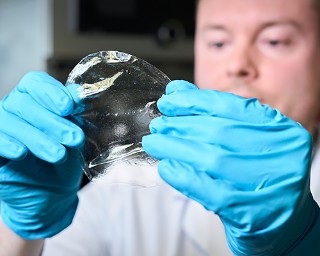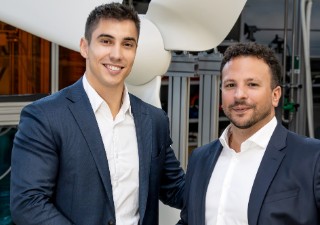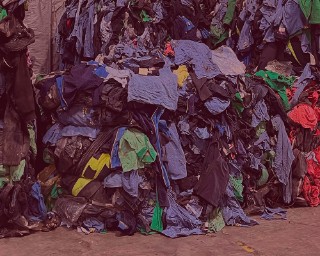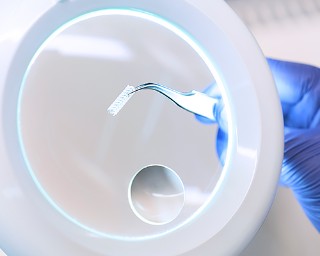Polyurethanes (PUR) are found in many products, such as upholstered furniture, foam or insulation materials, flooring, paints and even medical catheter tubes. The production of these high-demand plastics, however, relies on toxic isocyanate. Fraunhofer researchers have now developed an alternative production process using harmless dicarbamate.
more infoPress | Media
-

After two years of research and development, the German-Chilean project Power-to-MEDME-R&D was successfully completed. The focus was on sustainable production of green hydrogen as well as the derivatives methanol and dimethyl ether (DME) in Chile. Researchers at Fraunhofer Institute for Applied Polymer Research IAP in Germany developed iridium-reduced catalysts for hydrogen electrolysis. These reduce the cost of hydrogen production and are scalable through a unique process – a central foundation for industrial-scale hydrogen production and economic utilization.
more info -

Combining expertise and accelerating future-oriented developments – at the beginning of the year, the Fraunhofer Institute for Applied Polymer Research IAP in Potsdam Science Park is sharpening its institutional profile through structural and personnel changes, thereby strengthening its strategic orientation in line with growing research and industry requirements. The restructuring of the institute is reflected not only in personnel changes, but also in renaming and departmental changes.
more info -

Is it possible to recover plastic recyclates from previously unused waste streams in order to produce high-quality fibers and films? How can bio-based polymer fibers be manufactured so as to allow adjustable biodegradability? These are the questions being addressed by researchers from the Fraunhofer Cluster of Excellence Circular Plastics Economy CCPE in the Zirk-Tex project. As an alternative to mechanical processes, they are jointly developing innovative recycling methods for the production of sustainable roof underlayments and geosynthetics. This involves the analysis of the entire value chain at pilot scale.
more info -

Textile waste could serve as a valuable source of raw materials for sustainable plastics in the future, according to the joint TexPHB feasibility study conducted by the Fraunhofer Institute for Applied Polymer Research IAP, Beneficial Design Institute GmbH and matterr GmbH. The study will be presented to the public for the first time at a network meeting on 25 November 2025 at the State Chancellery in Potsdam.
more info -

Efficient use of methane and CO₂ from biogas: Thanks to novel flat membranes, biogas can be processed directly and energy-efficiently – even in small plants. In the Bio4Value project, the Fraunhofer Institute for Applied Polymer Research IAP in the Potsdam Science Park, together with KS Kunststoffbau GmbH and the Leibniz Institute for Agricultural Engineering and Bioeconomy ATB, is developing a technology that opens new perspectives for the material use of methane and CO₂.
more info -

Those who want to generate electricity for their own consumption using wind power need a powerful small wind turbine. Researchers at the Fraunhofer Institute for Applied Polymer Research IAP, in collaboration with the BBF Group, have developed a lightweight rotor that is specifically designed for operation in regions with low wind speeds. The first prototypes have now been delivered. These systems enable private households, businesses, or disaster relief organizations to set up a decentralized energy supply and use renewable energy efficiently.
more info -

How can the state of Brandenburg benefit from a circular textile industry? This question is addressed in the new policy paper "Closing the loop in the textile industry: Value creation in the state of Brandenburg." Based on the „TexPHB“ feasibility study funded by the Brandenburg Ministry of Climate Protection, it shows how textile waste can be integrated into new value chains.
more info -

How can new bio-based and biohybrid materials with improved features be developed faster? Six Fraunhofer institutes are jointly exploring this question in the SUBI²MA flagship project, using an innovative bio-based polyamide developed by Fraunhofer researchers as a model. Its specific properties make it a promising alternative to fossil-based plastics.
more info -

Stents are used to remove narrowings (stenosis) in blood vessels, stabilize the vessels and thus prevent heart attacks or strokes. However, the implantation process damages the inner wall of blood vessel, and in addition a foreign body material is inserted into the blood vessel wall. Both factors can contribute to restenosis of the affected vessel. Researchers at the Fraunhofer Institute for Applied Polymer Research IAP at Potsdam Science Park aim to address these issues with specially coated, biocompatible, degradable stents. The team won recognition for developing a prototype as part of the senetics Innovation Award 2025.
more info
